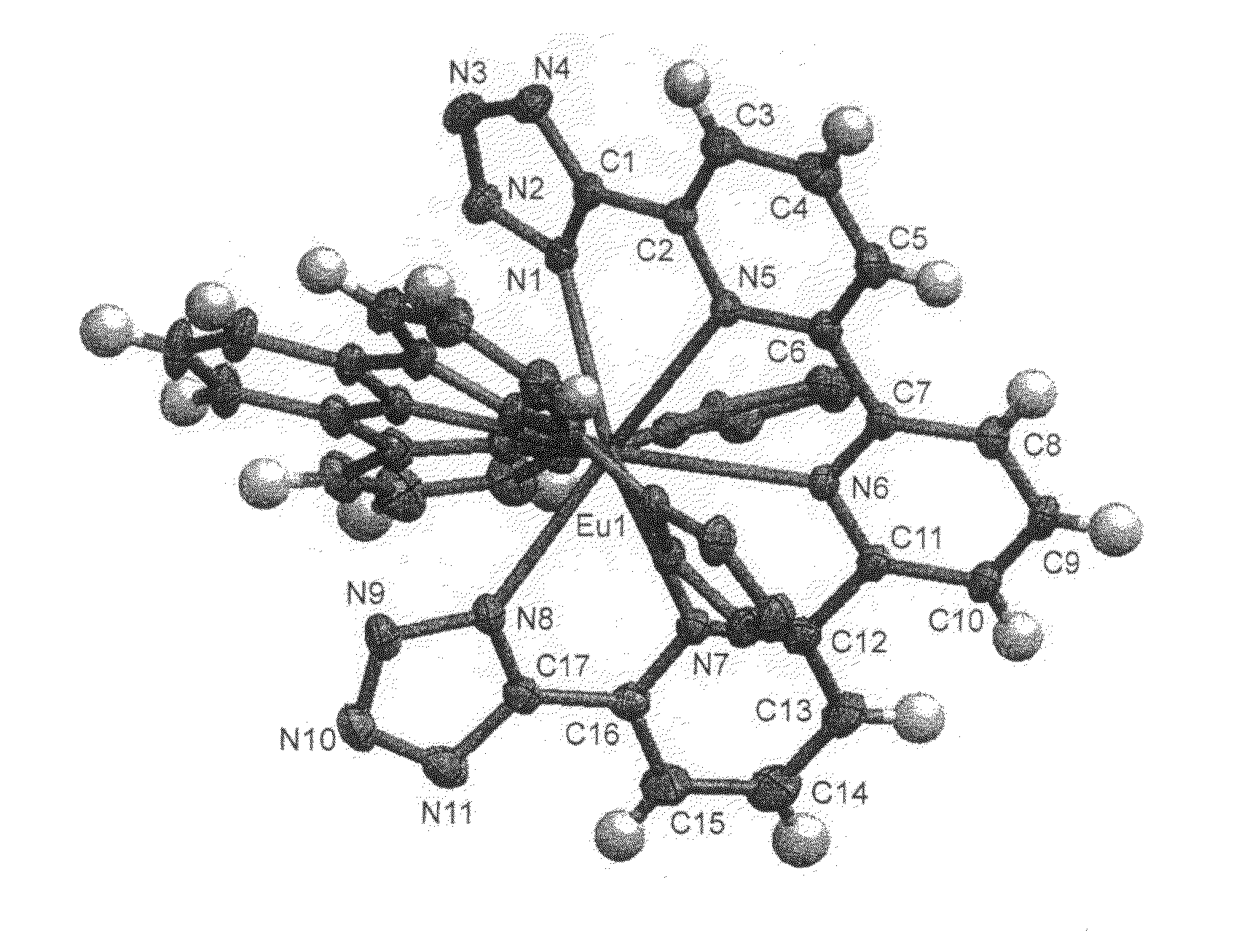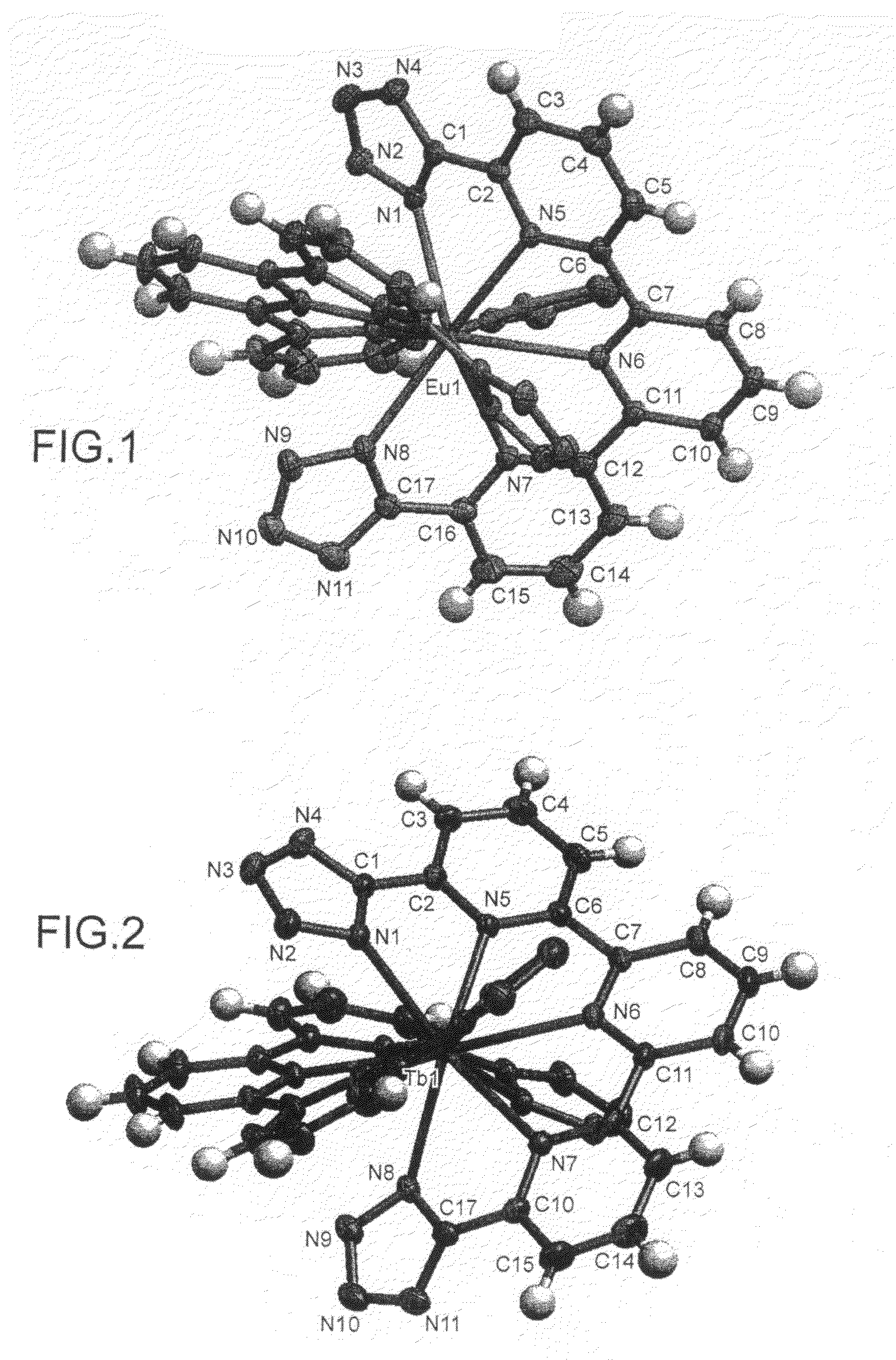Compounds useful as ligands and particularly as organic chromophores for complexing lanthanides and applications thereof
a technology of organic chromophores and compounds, which is applied in the field of compounds useful as ligands and particularly as organic chromophores for complexing lanthanides, can solve the problems of low stability of compounds such as thes
- Summary
- Abstract
- Description
- Claims
- Application Information
AI Technical Summary
Benefits of technology
Problems solved by technology
Method used
Image
Examples
example 1
Complexes of 2,2′-6′,2″-terpyridine-6,6″-ditetrazole and various lanthanides (europium, terbium and neodymium)
1.1. Synthesis of 2,2′-6′,2″-terpyridine-6,6″-ditetrazole
[0088]The title compound, referred to hereinafter as TPDTZ, which corresponds to the compound of particular formula (II-d) shown above, is synthesized starting from [2, 2′-6′,2″-terpyridine]-6,6″-dicarbonitrile, referred to hereinafter as compound 1, in accordance with the following reaction scheme:
Synthesis of Compound 1
[0089]Compound 1 is synthesized as described by Mukkala et al. in Helvetica Chimica Acta 1992, 75, 1621-1632 [9].
Synthesis of TPDTZ
[0090]A mixture of 1.133 g (4.51 mmol) of compound 1, 1.300 g (20 mmol) of sodium azide (NaN3) and 1.07 g (20 mmol) of ammonium chloride (NH4Cl) in 36 ml of anhydrous dimethylformamide (DMF) is reacted under argon at 125-130° C. for 16 hours. After cooling, the inorganic salts are filtered off and the solvent is removed under reduced pressure. The residue is taken up in d...
example 2
Complex of 2,2′-6′,2″-terpyridine-4′-(p-bromophenyl)-6,6″-ditetrazole and europium
2.1. Synthesis of 2,2′-6′,2″-terpyridine-4′-(p-bromophenyl)-6, 6″-ditetrazole
[0133]The title compound, referred to hereinafter as TPDTZPB, which corresponds to the compound of particular formula (II-b) shown above, is synthesized starting from [2,2′-6′,2″-terpyridine]-4′- (p-bromo-phenyl)-6,6″-dicarbonitrile, referred to hereinafter as compound 2, in accordance with the following reaction scheme:
Synthesis of Compound 2
[0134]Compound 2 is synthesized as described by Hovinen et al., Organic Letters 2001, 3, 2473-2476 [10].
Synthesis of TPDTZPB
[0135]A mixture of 435 mg (0.99 mmol) of compound 2, 325 mg (5 mmol) of NaN3 and 267 mg (5 mmol) of NH4Cl in 20 ml of anhydrous DMF is reacted under argon at 130° C. for 20 hours. After cooling, a precipitate is recovered by filtration, and is treated with dilute hydrochloric acid, stirred for one hour and refrigerated. Filtration, washing with cold water and drying ...
example 3
Complexes of 4′-(5-bromo-2-thienyl)-2,2′-6′,2″-terpyridine-6,6″-ditetrazole and various lanthanides (europium and neodymium)
3.1. Synthesis of 4′-(5-bromo-2-thienyl)-2,2′-6′,2″-terpyridine-6,6″-ditetrazole
[0152]The title compound, referred to hereinafter as TPDTZTB, which corresponds to the compound of particular formula (II-a) shown above, is synthesized starting from 4′-(5-bromo-2-thienyl)-2,2′-6′,2″-terpyridine, referred to hereinafter as compound 3, in accordance with the following reaction scheme:
Synthesis of Compound 3
[0153]Compound 3 is synthesized as described by Ferraudi, Moya and colleagues in López et al., Inorganica Chimica Acta 2004, 357, 3525-3531 [11].
Synthesis of 4′-(5-bromo-2-thienyl)-2,2′-6′,2″-terpyridine 1,1″-dioxide or compound 4
[0154]A suspension of 5.62 g (22.8 mmol) of 70% 3-chloroperbenzoic acid in dichloromethane (CH2Cl2) is added slowly to a solution containing 2.40 g (6.09 mmol) of compound 3 in 50 ml of CH2Cl2. The mixture is stirred for 18 hours at amb...
PUM
 Login to View More
Login to View More Abstract
Description
Claims
Application Information
 Login to View More
Login to View More - R&D
- Intellectual Property
- Life Sciences
- Materials
- Tech Scout
- Unparalleled Data Quality
- Higher Quality Content
- 60% Fewer Hallucinations
Browse by: Latest US Patents, China's latest patents, Technical Efficacy Thesaurus, Application Domain, Technology Topic, Popular Technical Reports.
© 2025 PatSnap. All rights reserved.Legal|Privacy policy|Modern Slavery Act Transparency Statement|Sitemap|About US| Contact US: help@patsnap.com



